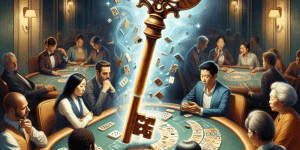Many players make the common mistake of focusing only on the excitement of the dice roll in Craps, neglecting the strategic elements that can significantly lower the house edge. Mastering Craps involves not only understanding the bets but also implementing strategies that optimize your chances of winning.
Understanding the Layout and Best Bets
Craps can seem overwhelming with its complex table layout packed with a variety of betting options. Key to mastery is knowing which bets to make and which to avoid.
Opt for ‘Pass Line’ and ‘Come’ Bets
The ‘Pass Line’ bet is one of the best bets in all of casino games due to its low house edge of approximately 1.41%. After the come-out roll, if a 7 or 11 is rolled, the ‘Pass Line’ bets win. Should the shooter roll a 2, 3, or 12, the bet loses. However, if any other number is rolled, it becomes the ‘point’, and the shooter aims to roll this number again before a 7 for ‘Pass Line’ bets to win.
Similarly, ‘Come’ bets are like ‘Pass Line’ bets but can be made after the point is established. They also offer a low house edge and should be part of your betting strategy.
Avoid Proposition Bets
Proposition bets might offer high payouts, but they come with a significantly higher house edge. Bets like ‘Any 7’ or ‘Any 11’ are tempting due to their high reward potential, but they decrease your overall chance of emerging ahead.
Implementing a Craps Strategy
While Craps is a game of chance, using a strategy can help manage your bets more effectively.
Using the 6/8 Strategy
Since 6 and 8 are the most frequently rolled numbers after 7, placing bets on these can be lucrative. A good strategy involves placing ‘Place to Win’ bets on these numbers. This move has a lower house edge compared to most other non-line bets and can be a steady way to accumulate wins.
Setting Loss Limits
Before you start playing, decide on a loss limit. This is a practical figure that, when reached, signifies it’s time to step away from the table. This helps prevent the common pitfall of chasing losses, which can lead to bigger financial problems.
Bankroll Management for Craps
Effective bankroll management is crucial for a sustained and enjoyable playing experience at the Craps table.
Establish Your Bankroll Size
Determine the amount of money you can afford to lose before you begin playing. A general rule is to have a bankroll that can cover at least 10 to 20 times your average bet. This allows you to handle the swings and variance involved in the game.
Use the Win Goals and Loss Limits
Set a win goal, which is a percentage of your session bankroll that you aim to win. Having a 20% win goal is a reasonable target. Once you reach this goal, it’s a good idea to pocket the profits and play with the original bankroll only. This strategy helps maximize winnings while limiting risks.
Increasing Your Winning Odds
No surefire strategy guarantees success in Craps, but you can increase your chances significantly by playing smart.
Practice with Online Simulators
Before hitting the tables, consider practicing with online Craps simulators. These platforms give you a feel of the game and allow you to refine your strategies without the risk of losing real money.
Stick with What Works
Once you find a strategy that works for you, stick with it. Consistency in betting strategy can lead to more predictable results and better handling of the bankroll.
In conclusion, while the raucous environment of the Craps tables can be very enthralling, keeping a cool head and sticking to a structured way of betting can elevate your game. Remember, in Craps, like in any casino game, patience, practice, and persistence are the keys to success.

David Garato is a luminary in gaming journalism, renowned for peeling back the curtain on the gaming world with his witty and insightful commentary. A decade into weaving stories from the pixelated edges of indie games to the expansive universes of AAA titles, David’s work is a thrilling blend of analysis and adventure. When not writing, he’s live-streaming, sharing his gaming exploits with an engaged and growing audience. David doesn’t just write about games; he lives them, making him a trusted guide in the gaming community.
















